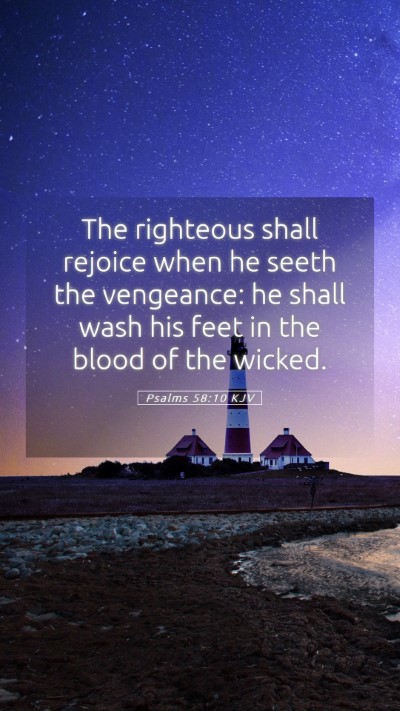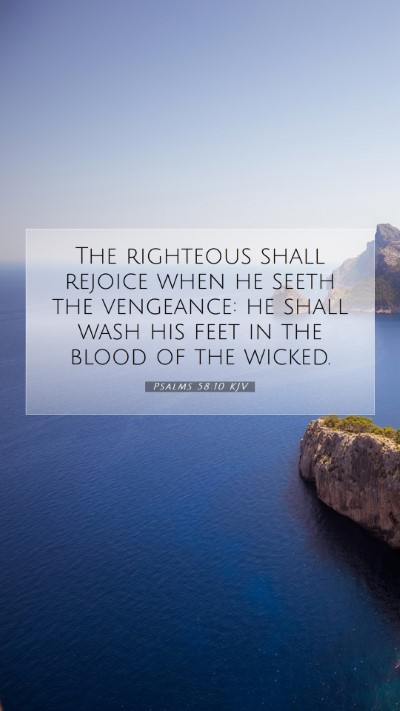Bible Verse Meaning: Psalms 58:10
Verse: "The righteous shall rejoice when he seeth the vengeance: he shall wash his feet in the blood of the wicked."
Overview of Psalms 58:10
This verse from the Book of Psalms can be challenging to interpret without understanding its historical and theological context. The psalmist contrasts the fate of the wicked with that of the righteous, expressing a future joy and vindication for those who uphold justice and seek righteousness. This sentiment is echoed throughout Scripture, where the triumph of righteousness over wickedness is a recurring theme.
Bible Verse Interpretation
In examining the meaning of this verse, several public domain commentaries provide valuable insights. Below are some of the key interpretations.
Matthew Henry's Commentary
Matthew Henry highlights the significance of justice in the divine order. He points out that the 'righteous' are those who follow God's law, and their rejoicing is rooted in the ultimate victory of good over evil. The imagery of 'washing feet in the blood of the wicked' symbolizes complete and utter defeat of evil, suggesting that the righteous will see God's judgment executed against those who oppose His ways.
Albert Barnes' Notes on the Bible
Albert Barnes emphasizes the certainty of God's justice and judgment. He notes that the rejoicing of the righteous at the 'vengeance' does not imply vindictiveness but rather an acknowledgment of God’s righteous judgment. This passage serves as a reminder that while the wicked may prosper temporarily, their end is destruction, while the righteous will be vindicated.
Adam Clarke's Commentary
Adam Clarke provides a detailed exposition of the cultural background informing this psalm. He explains that the righteous's washing of their feet in the 'blood of the wicked' is a metaphor for triumph and overcoming adversaries. Clarke points out that this verse can be seen as a prophetic anticipation of the final judgment, where God's justice prevails.
Key Themes and Insights
- The Triumph of Righteousness: The verse underscores a significant theme in the Bible: the ultimate triumph of righteousness over wickedness.
- Divine Justice: The rejoicing of the righteous points to God's commitment to justice, assuring believers that all evil will be addressed.
- Imagery of Judgment: The graphic imagery serves to highlight the seriousness of God's judgment and the fate of the wicked.
Related Scriptures
- Psalm 37:38: "But the transgressors shall be destroyed together: the end of the wicked shall be cut off."
- Revelation 19:2: "For true and righteous are his judgments: for he hath judged the great whore, which did corrupt the earth with her fornication."
- Isaiah 59:18: "According to their deeds, accordingly he will repay, fury to his adversaries, recompense to his enemies."
Application and Relevance
Understanding Scripture is essential for applying Biblical teachings to our daily lives, especially in navigating difficult situations where justice seems delayed. Psalms 58:10 reinforces the belief that ultimately, God's justice will prevail, encouraging believers to endure in righteousness amid injustice.
For Bible Study Groups
This verse can serve as a powerful discussion starter in bible study groups, prompting conversations about justice, righteousness, and God's character. Consider exploring historical contexts and applications in today's world.
Online Bible Study Resources
Utilizing bible study tools and online bible study resources may enhance learning about such verses, providing various interpretations and exegesis that enrich overall understanding.
Studying the meaning of Bible verses such as Psalms 58:10 enables believers to grasp profound truths about God’s nature and His promises to the righteous.
Conclusion
In summary, Psalms 58:10 offers insights into the strong themes of divine retribution and the joy of the righteous. The combined insights from the commentaries of Matthew Henry, Albert Barnes, and Adam Clarke provide a multi-faceted understanding suitable for bible study insights and enhancing Biblical exegesis. Through these teachings, we can find comfort and encouragement in knowing that God's justice ultimately prevails.


